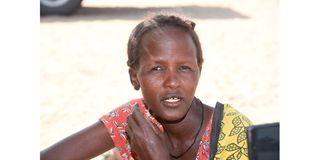The life and times of an Ilimanyang woman

Athuulu Erupe during the interview outside her hut in Kalokol, Turkana County on December 13, 2021. Her seven children have a rare skin disorder, which led to her husband abandoning them.
What you need to know:
- In 2014, Athuulu Erupe's husband left after he realised all the children he had sired with her displayed a hereditary trait.
- She is from the Ilimanyang tribe, a community where people suffer from a condition that requires water to be sprinkled on their bodies at regular intervals.
- The condition affects only boys and men, making it impossible for them to grow up to adulthood when they can marry.
Athuulu Erupe, 33, is hiding from the harsh rays of the sun behind her manyatta house (traditional hut) in Kalokol, less than a kilometre from the shores of Lake Turkana. The mother of seven is lost in deep thought.
She has assembled her children, all who suffer from a rare skin disorder. She wonders where to find water and food for them.
Our team finds her pouring the little water she has on her children to cool them from the horrendous heat sweeping across the drought-stricken county. We too, feel the heat.
Ms Erupe is from the Ilimanyang tribe. People from this community faint if they don’t eat within an interval of one hour, or water is not sprinkled on their bodies after every half an hour. If the situation worsens, they die.
Their hairless skin resembles that of a mudfish and is tight when exposed to the sun, causing a lot of pain on their bodies. That is why water must be sprinkled on their bodies consistently.
Overheating
This condition is known as anhidrosis or hypohidrosis, a dysfunction where a person is unable to sweat when they are hot.
If it occurs in the entire body, it can result to overheating and eventually heatstroke, a potentially life-threatening condition.
The condition affects only boys and men, making it impossible for them to grow up to adulthood when they can marry. This has forced the Ilimanyang to marry the Turkana.
When Ms Erupe married her husband whom she identifies only as Ekuom in a year she cannot recall, she never knew that being an Ilimanyang would threaten her union to the extent of destroying it.
In 2014, her husband left after he realised all the children he had sired with Erupe displayed this hereditary trait.
“It is now seven years since my husband left me with my seven children. He thought we could get a child who does not possess Ilimanyang traits but after seven attempts, we did not succeed. He became bitter and questioned what kind of children I was giving him,” narrates Erupe.

Ms Erupe (right) with her seven children outside their hut in Kalokol on December 13, 2021. The Ilimanyang have a rare condition where the skin does not have pores making it difficult for the body to regulate the temperatures naturally.
She says most Ilimanyang women who are married to Turkana men and have not been blessed with ‘normal’ children, are suffering from rejection.
“I am literally stigmatised because I am alone. Drought is biting here in Turkana, there is no water and my children need it to survive. In school, they cook githeri (mixture of maize and beans) but my children’s teeth have not developed, hence they cannot eat it. I have to look for food but where do I get it?” she poses.
Erupe adds: “Being an Ilimanyang woman is stressful. There are no Ilimanyang men since most of them do not get to age 30, forcing us to marry the Turkana, who eventually reject us with our children.”
Nancy Ebulon, the only educated member of the minority tribe, says the genetic condition developed during a marriage between their Turkana grandfather and an Elmolo wife from Marsabit County.
Ms Ebulon says that as the sixth generation of Ilimanyang, they are just about 40 of them as some have died due to the vagaries of weather.
She says it is easier for their women to give birth to normal children than it is for men.
“As Ilimanyang women, we cannot marry our own men because this condition does not allow them to reach marriage age. When we marry the Turkana, our marriages break up because of the children we give birth to,” Ms Ebulon elucidates.
She adds that in case a woman is blessed with normal Ilimanyang children, the husbands do not stick fully to their families; they marry second wives since they are uncomfortable with Ilimanyang children.
Safe delivery
“Our greatest challenge is that most children die in the initial hours or days after a safe delivery as many miss out to take care of the delicate baby who must be sprinkled with water all the time and be fed on tender food." she says.
Ekadeli Ewoi in her 40s, says she always wished to get many children but her husband abandoned her.
“I gave birth to two boys who later died and the only surviving daughter is also facing the same pain of losing two of her five children.” Ms Ewoi says.
Ngasike Eyanae who has given birth to the allegedly youngest member of the tribe, says they need special recognition as most of them are poor and unable to take care of their special needs.
With the scorching sun, the men can’t get out to the grazing fields or look for food and water as the exposure may lead to their death.
Mary Etilej, 26, says her family survives on rice and maize, which must be crushed with stones to make it easier to eat.
“If there is no water in my manyatta, I carry my child to the water point. Three of my children have already died because we failed to consistently provide for them. My husband married another woman and has a new home at Kalokol,” says Ms Etilej.






